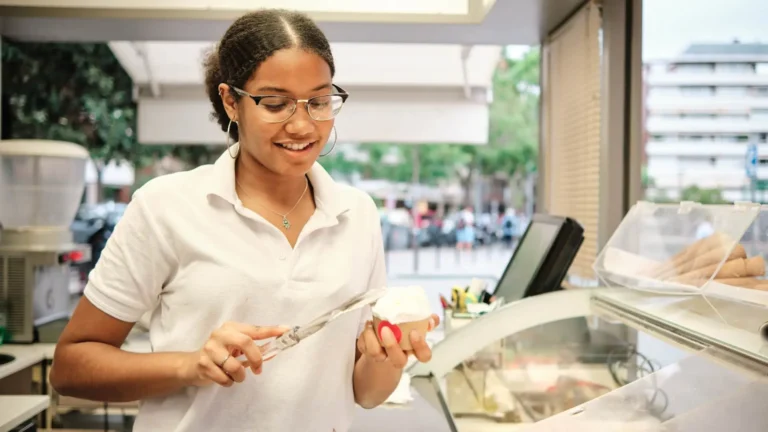Think about it, college is basically a mini city. Thousands of students in one place, all looking for food, clothes, tech, or fun stuff to buy. If you’ve ever thought, “I could totally sell this on campus,” you’re not alone.
Student-led businesses and pop-ups are blowing up on campuses everywhere. From cookie stands outside the library to vintage thrift racks in the student center, these little ventures are making students extra cash and giving them serious business skills.
And here’s the best part: tools like Blitz’s DealsGPT can help you find affordable supplies and resources to kickstart your setup. Instead of spending hours hunting for a card reader, a folding table, or promo flyers, DealsGPT finds discounts in seconds.
Ready to set up your legal pop-up? Let’s dive into on-campus vendor permits.
What Is an On-Campus Vendor Permit?
An on-campus vendor permit identifies you as the person who has official permission to sell goods or services at school. No matter what it is that you are peddling, it also allows your pop-up to be safe, legal, and less of a hassle. To be sure, let’s have a bit more information about it.
Understanding Vendor Permits
A vendor permit is basically your golden ticket to sell legally on campus. Without it, you’re just a student with a table, just a rule breaker in the eyes of campus officials.
Every school has its own regulations, but this is how it is generally outlined:
- Food & Drinks: This is the category with the most restrictions. In most cases, you will be required to have a health permit and food handler certification.
- Clothing or merch vendors: Mostly just a standard campus permit.
- Tech or electronics: May need proof of product safety or warranties.
Think of a vendor permit as making your business official. Read about Dorm Room Side Businesses That Make Money (2025–2026)
Legal Requirements for Campus Pop-Ups
Acquiring a permit does not mean everything is done via a tick on the list; it rather ensures that the pop-up is legitimate and that everyone is safe. Here’s why this document is necessary:
- Liability protection: If someone gets food poisoning (yikes), you’re not stuck with the blame if you’ve followed the rules.
- University compliance: Educational institutions want to avoid chaos in public areas. The permits assist in controlling who is selling what and where.
How to Apply for an On-Campus Vendor Permit
Getting your vendor permit is easier than you might think. Just follow the process, bring the right documents, and you’ll be set up in no time. Here’s how you can apply:
Step-by-Step Guide to the Application Process
Obtaining your vendor permit may feel daunting, yet, it is basically, once you know where to head, not so much. Here is the whole process laid out step by step:
- Find the right office. Usually, it’s Student Union, Campus Services, or the Office of Events.
- Fill out an application. Expect forms asking who you are, what you’re selling, and when.
- Show your documents. You might need:
- A student ID
- Proof of insurance (if food or higher-risk items)
- Business license (if your campus requires one)
- Pay the fee. Some schools charge $10, others $100. It depends.
- Wait for approval. Once approved, you’ll get a permit for a certain time or event.
And here’s where Blitz’s Alerts feature comes in handy. You can set it to ping you when permit deadlines are coming up, so you don’t miss out on prime selling days.
Understanding Campus Rules and Regulations
Every campus has its own rules for pop-ups. This is what you’ll typically find:
- Pop-up limits: Some schools restrict the number of vendor events per semester.
- Location rules: You can’t just set up wherever you want. Common spots are the quad, the student center, or during school-hosted events.
- Conduct codes: If your business goes against school policies (like selling fake merch or stuff that’s not campus-appropriate), you’ll get shut down fast.
You should read the code of conduct. Then match your business to what’s allowed. If you don’t, the school will happily shut you down mid-sale.
Special Considerations for Food Vendors
If you’re selling food, buckle up, this is where things get strict. Here’s what you’ll need:
- Health permits are non-negotiable. You’ll have to pass safety inspections and occasionally even kitchen inspections.
- Food handler certification may be mandatory, particularly for baked food or cooked meals.
- Common mistakes to avoid:
- Not labeling ingredients (allergies are a big deal)
- Improper storage (don’t leave food out in the sun)
- Skipping the handwashing station (yes, schools check!)
Food vendors face the toughest rules, but once you’re set up properly, you’ll be the most popular table on campus. Discover DealsGPT for Foodies — Best Campus Meal Deals This Week
How to Set Up a Successful Pop-Up Shop on Campus?
Setting up your pop-up is not just about bringing a table and hoping that people will pass by. A perfect location, clever marketing, and smooth logistics are the keys to the difference between a busy booth and the silent cry of the desert.
Choosing the Right Location
Location is everything. You want eyes on your booth, not tucked away where no one walks. Here are some best spots:
- Student Union lobby
- The quad on sunny days
- Outside sporting events
- Big campus fairs
Basically, choose that location where students walk or chill. And if you don’t know where to start? Blitz’s JobsGPT can connect you with event organizers looking for student vendors.
Attracting Customers: Promotion and Marketing
You can have the cutest table setup, but if no one knows you’re there, sales flop. Here are some smart moves that you can follow:
- Post in campus Facebook groups or Discord servers.
- Blast it on Instagram with a countdown and location tag.
- Offer a discount, like “First 20 people get 20% off.”
- Do a giveaway, such as Free stickers or candy, and you will always draw a crowd.
Students love deals. If it feels like a mini-event, they’ll show up.
Logistics: Setting Up, Operating, and Breaking Down Your Shop
A smooth setup makes you look legit and helps everything run without a hitch. Here’s how:
- Set up early: A messy table shouts “unprepared.”
- Manage your inventory: Bring just the right amount of products, neither too little nor too much.
- Make payment easy: Venmo, Cash App, and QR codes are great helpers.
- Break down fast: Most schools give you a set window. Stick to it.
How Blitz Tools Can Support Your On-Campus Pop-Up
Blitz is like your campus business sidekick. Here’s how its smart tools can help you find opportunities, manage your cash, and score deals for your pop-up.
JobsGPT for Finding Pop-Up Opportunities and Events
Don’t waste hours Googling “campus vendor opportunities.” Use JobsGPT. It scans for local events, fairs, and markets where students can set up pop-ups. You can even find side gigs if you’d rather test the waters before starting your own booth.
BudgetGPT for Managing Earnings and Expenses
Selling feels fun until you realize you spent $50 on decorations, $30 on supplies, and only made $70. Profit? Barely. That’s where BudgetGPT saves the day. It tracks every dollar you earn and spend, shows your real profit, and helps you spot where you can save. Think of it as your money coach, making sure your side hustle actually boosts your wallet, not your stress.
DealsGPT for Finding Discounted Equipment and Supplies
Starting a pop-up doesn’t have to drain your budget. DealsGPT hunts down student discounts on tables, signs, supplies, and even ingredients, so you can set up shop for less. Less time bargain hunting means more time selling and making your pop-up stand out.
FAQs on On-Campus Vendor Permits
How much does it cost to apply for a vendor permit on campus?
Permit fees differ by campus but are generally reasonable, sometimes anywhere from a nominal fee to defray administrative expenses. Some campuses even offer student-run pop-up events and charity events with free permits or discounted ones.
How do I find out if my school allows pop-up shops?
Search your school’s website for “vendor policy” or “pop-up guidelines,” or email campus services. You can also ask around at the student union; someone will point you in the right direction.
What products can I sell at an on-campus pop-up?
You can typically sell any safe, legal, and policy-compliant product. Popular choices include crafts, art, clothing, accessories, and small packaged goods. Always check your school’s restrictions before planning.
How do I handle taxes from pop-up sales?
Even minor campus sales can involve collecting sales tax or reporting income. Document carefully all transactions and check with your school or local tax office to maintain compliance.
Can I sell food at my on-campus pop-up, and what are the health requirements?
Yes, if you follow health rules, get a food handler’s permit, and store food safely. Some schools only allow packaged snacks. Always ask about local health codes and campus food policies first.
Conclusion – Start Your Campus Pop-Up with Confidence
Pop-ups are the ultimate college side hustle. They’re flexible, profitable, and give you hands-on business experience you can’t get from just sitting in lectures. Yes, you’ll need a permit. Yes, there’s paperwork. But once you’re set up, it’s worth it.
And don’t forget, you’ve got Blitz in your corner. JobsGPT, BudgetGPT, and DealsGPT work together to make your campus venture smoother. From discovering opportunities to managing money and finding supplies, Blitz takes the stress out of planning and lets you focus on growing your small business.
Start using Blitz today and turn your pop-up ideas into reality. Saving time, money, and effort has never been this easy or fun.





